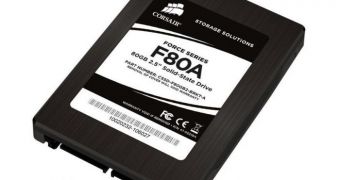out with the announcement that it was moving its SSDs to 2Xnm process technologies, but Corsair is not really that far behind, having made a similar decision.
Advancing to a new manufacturing process, for solid state drives, means improvements to pretty much every feature, except (maybe) design.
In addition to the performance and power efficiency benefits, SSDs based on smaller process technologies also have the advantage of more accessible prices (more chips can be made for the same costs).
The two products that will spearhead Corsair's migration from 34nm to 25nm MLC (multi-level cell) NAND are the F80-A and the F115-A.
They use the SandForce SF-1200 controller, 2.5-inch casings and the SATA 3.0 Gbps connectivity.
All 25nm drives will come with the “-A” suffix from now on, so as to allow end-users to easily differentiate between them and previous-generation models.
“So that our customers are perfectly clear about what they are getting, we will be changing the model numbers on all 25nm based drives and transitioning the drive capacities we offer where necessary,” said Jared Peck, global product marketing manager for SSDs at Corsair.
“For example, a drive that would have been sold as 120GB when built with 34nm flash will be launched as a 115GB version,” he added.
“All Force Series drives built with 25nm flash will also have a ‘-A’ suffix on the part and/or model number, making it easy to determine exactly what you’re getting.”
"The Corsair and SandForce engineering teams have been working closely with the key flash memory suppliers to profile and qualify 25nm parts and we’ve been running our Force drives through performance and reliability testing alongside them," added said John Beekley, VP of technical marketing at Corsair.
“We're pleased with the progress that’s been made in getting the Force Series 25nm drives ready to ship to customers,” Beekley went on to saying.
By the end of February, Corsair should already have the 80 GB, $169 drive (F80A) and 115 GB, $215 drive (F115) up for sale. By contrast, 34nm-based F80 an F120 are more expensive ($199 and $249).

 14 DAY TRIAL //
14 DAY TRIAL //